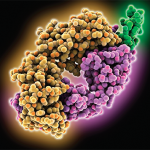Dr. Gary S. Hoffman of Cleveland Clinic, who wrote an editorial related to this report, tells Reuters Health by email, “In the setting of a patient with granulomatosis with polyangiitis (GPA) or microscopic polyangiitis (MPA), who has already experienced numerous relapses or has accumulated damage from vasculitis (e.g., chronic renal failure or severe lung injury, etc.), whose disease, if uncontrolled, is likely to cause further profound disability or death, extreme caution is advised before discontinuing any form of successful, well-tolerated therapy, including rituximab.”2
“However, for lower-risk patients, we do not know the risk-benefit odds of indefinite rituximab treatment versus cautiously monitoring for and treating early signs of relapse,” he said. “For those patients, if a long-term remission occurs after several rituximab infusions, at this time, it may be safest to carefully monitor off treatment and treat for the earliest signs of relapse.”
Dr. Chetan Mukhtyar of Norfolk and Norwich University Hospital, Norwich, U.K., co-authored the European League Against Rheumatism (EULAR)/European Renal Association-European Dialysis and Transplant Association (ERA-EDTA) recommendations for the management of ANCA-associated vasculitis. He tells Reuters Health by email, “The implications [of the findings] are two-fold: firstly, I think we should try and use lower doses of rituximab for remission maintenance. On both sides of the Atlantic, we have been using 1 g pulses every six months, and this firmly proves that 500 mg will do the trick.”
“Secondly, we should use rituximab for longer than the two years that we currently do,” he says. “Especially in the U.K., the authorities will have to sit up and take notice. Currently the funding approval for rituximab maintenance is only available for patients who have a relapse after initial rituximab induction. Which means that there is no remission-maintenance treatment after the 1st rituximab induction.”
“I think this report needs revalidation, like all good science,” says Dr. Mukhtyar, who was not involved in the study. “But after this, we should be using less rituximab, but more regularly and for longer.”
The study was funded by research grants from the French Ministry of Health and from Hoffman-La Roche, which also provided rituximab for the study.
References
- Charles P, Perrodeau E, Samson M, et al. Long-term rituximab use to maintain remission of antineutrophil cytoplasmic antibody-associated vasculitis: A randomized trial. Ann Intern Med. 2020 Jun 2. Online ahead of print.
- Hoffman GS. Vasculitis: Again, changing the standard of care. Ann Intern Med. 2020 Jun 2. Online ahead of print.

